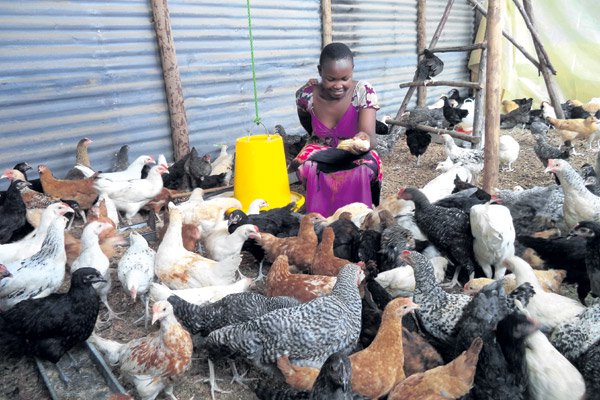Meet Immaculate Ochieng, a poultry farmer located in Kisumu. Immaculate has 700 kuroiler chicken, 200 which are cockerels and the rest hens. “I sell eggs and birds for meat and hatch chicks. I have been doing this for over three years now,” she says.
Immaculate started chicken rearing as a hobby in 2012. She bought a 60 capacity egg incubator using her ‘chama’ savings. She also bought two crates of eggs at Sh. 1,800. Through the support of her husband and the youth group in which she is a member, her business has expanded.
Kenya’s Daniel Adongo homeless, into drugs after blowing millions in US
Immaculate is an all-round farmer who is carving a niche in the business as she works on her dream of building a poultry empire. She also makes poultry feeds using a machine called drum mixer that she owns. She feeds her chicken with some and sells the rest to other farmers.
Immaculate further has a 3,000 egg capacity incubator that she uses to hatch eggs for sale. Also, she offers brooding services to farmers.
“I started this business after getting tired of being a stay-at-home mum. I talked to my husband and he agreed to support me. He bought the birds and built the poultry houses. I later bought the incubator at Sh. 44,000 and the feed mixer.”
The farmer collects 860 eggs after every two days. From this, she keeps 350 for hatching. She sells unfertilized ones at Sh330 per crate while the fertilised Sh900. “I put the fertilised eggs into the incubator after every seven days to ensure I have chicks all the time.”
Omingo Magara: I turned to modern dairy farming after losing in politics
For brooding services, which involves vaccinating chicks, keeping them in the brooder for several days and feeding them, the charges differ depending on the age of the birds. The cost ranges from Sh130 to Sh240 per chick per week, with brooding a month old birds attracting the highest fees.
She says many farmers buy three- week old birds because they are easy to manage as they have been vaccinated. She sells between 300 and 500 chicks each week.
She sells mature cocks at Sh1,200 and hens at Sh1,000. She disposes the cocks at four months at Sh500 to avoid inbreeding. If she does not get ready market, she separates them from the rest and waits for them to mature so that she can sell at Sh1,200.
“I market my products through free online classified websites,” says Immaculate, who is studying an online computer science programme at the University of the People, California, US.
To make feeds, she buys the ingredients that include maize germ, sunflower and cotton seed cake, pollard, grounded shells and salt (iodine) from dealers in Kisumu. She says salt is important during the formulation of feeds because lack of it in feeds or diet may result to diseases.
A 50kg bag of maize germ retails at Sh860 while the same amount of pollard goes for Sh1,050. “It is advisable to have one reliable supplier to buy the ingredients from for accountability. Besides, some of the ingredients sold in the market are contaminated and may affect the chicken,” says Immaculate, who researches heavily on poultry farming on the internet, and sells 50kg at Sh2,000.
For shells picked from the shores of Lake Victoria, she gets a kilo at Sh25 from a supplier in Ahero market.
“I have no problem balancing between studies, my family and rearing poultry. I submit my assignments every week which gives me time to concentrate on poultry and family.”
“As a married woman, I would get visitors, and I preferred cooking for them chicken. This prompted me to start rearing the birds,” says Immaculate, who is a member of Mazingira Youth Group, which gives her loans whenever she is in distress.
However, it has not been all rosy. Only 28 eggs out of the two crates she started with hatched. “By then, I had no idea that there was something like a candler to determine whether the eggs are capable of hatching.”
Poultry farming has made her sit with the high and mighty in the farming business. She recently travelled to Israel to learn from farmers there. The trip was sponsored by the UN Women, which seeks to equip them with leadership skills.
Jackson Achila, a poultry consultant based in Homa Bay at Blue Bound Farm, says the common poultry diseases are Newcastle, infectious bronchitis and gumboro, foul pox, foul typhoid and salmonella.
Revealed: Tuskys Supermarket owes suppliers Sh. 6.2 billion
“When birds are confined in one place, a farmer should be careful because one of these diseases may break out. However, these diseases can be managed through vaccination.”
He says it’s important to keep records of all birds especially the history of the parent birds so that the farmer is able to keep track of the diseases that have at one time affected them.
He advises farmers not rely on internet because they can be misled. “Unless it’s a site that gives the opinion of a well-known poultry consultant, then be cautious to use the information.”










I like what the lady is doing and that she has an understanding husband.I hope other women will also get on the band wagon, they can raise turkeys, goats, sheep, pigs, cows and anything else, maybe they can start an organization.Some how i think women are more aggressive when it comes to business.Be Bless.
Good job I Like your hard work, keep it up am impressed and want to start the same ,How do I get you?need to visit your farm. Am from GemRae Nyakach.